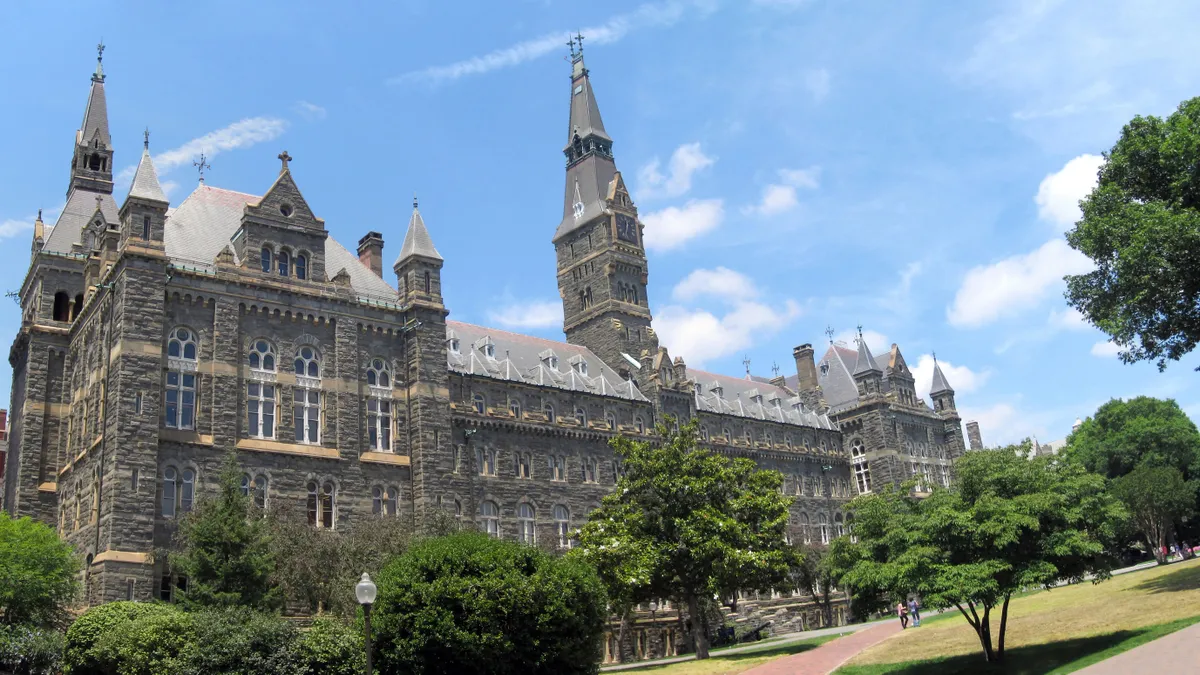Dive Brief:
- Georgetown University is adding a center for artificial intelligence (AI) technology and policy with the help of a $55 million grant from the Open Philanthropy Project, a nonprofit research and grant-making group.
- Billed as the largest of its kind in the nation, the Center for Security and Emerging Technology (CSET) will merge research on AI and advanced computing with the university's security focus to provide nonpartisan analysis to the U.S. and international policy and academic communities.
- The Washington, D.C.-based university's influence on policy was part of the reason it was selected. Its academic and research focus in ethics, governance, law and public policy was also cited. It will live in the Walsh School of Foreign Service.
Dive Insight:
The announcement follows an executive order that President Donald Trump signed in February to increase AI research and development. The order calls for more training in the form of apprenticeships, skills programs and STEM education, with a focus on computer science.
Georgetown joins at least two other U.S. colleges with big plans in AI. In October, MIT revealed its new, $1 billion College of Computing, which will integrate AI, computer science and data science throughout the institution. And in February, the State University of New York Polytechnic Institute, in Albany, announced a $2 billion investment from IBM to create an AI research center on the campus.
MIT snagged a $350 million gift from Stephen Schwarzman, CEO and co-founder of private equity firm Blackstone, to help create the college. SUNY, meanwhile, will also receive $30 million in cash and in-kind contributions from IBM to fund system-wide AI research and a $300 million grant from Empire State Development to make capital investments in the new center.
Big donations grab headlines, but colleges across the country are already exploring AI in less-obvious ways.
North Carolina's 58-campus public community college system is working with machine-learning firm Tanjo to implement an AI "brain" to map its digital content. The system hopes the new tool will make it easier for faculty to source documents from a central location.
More broadly, it shows how colleges are using AI to benefit their operations. Penn State, for example, has developed AI prototypes to help faculty develop courses, assemble course packs from open-source materials and automate assessments. The university's senior director for Teaching and Learning with Technology, Jennifer Sparrow, said at Educause this past fall that the features are meant to be a starting point for faculty, rather than a plug-and-play option to get a finished product.
Other speakers at Educause noted the need to be careful when using AI, which is vulnerable to biases that can develop by exposing the systems to bad interactions or partial information.
"You need to make sure that your environment matches your goals, your data set, your expected results," said Teddy Benson, the director of solution integration at Walt Disney World. "[AI engines] are in a sense infant virtual babies you need to take care of."
Of particular focus for Georgetown's new center will be the ethical implications of using new forms of technology in international security. "Technologists don't always consider the details of policy," said CSET founding director Jason Matheny in a press release, "and policymakers don’t always consider the details of technology."










